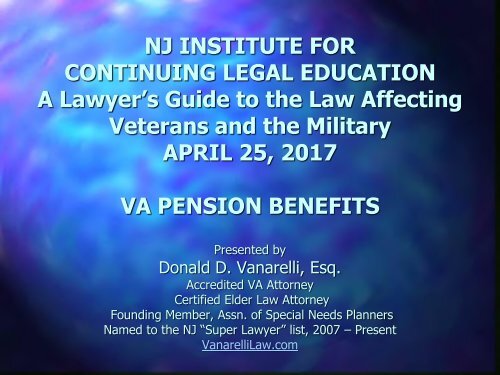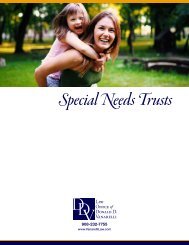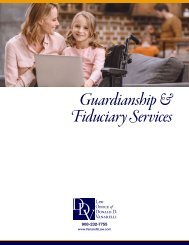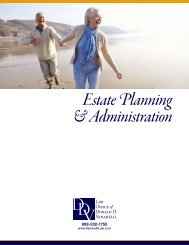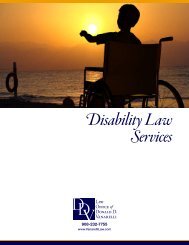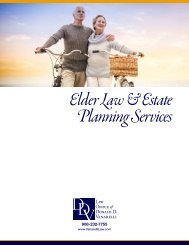VA Pension Benefits
This PDF covers benefits provided by the Department of Veterans Affairs (VA) range from healthcare, compensation and adaptive housing grants for service-connected disabilities, needs-based pensions, education, vocational training, home loan guarantees, life insurance, and burial and memorial benefits. For additional information call 908-232-7400 or visit https://vanarellilaw.com/va-benefits/
This PDF covers benefits provided by the Department of Veterans Affairs (VA) range from healthcare, compensation and adaptive housing grants for service-connected disabilities, needs-based pensions, education, vocational training, home loan guarantees, life insurance, and burial and memorial benefits. For additional information call 908-232-7400 or visit https://vanarellilaw.com/va-benefits/
You also want an ePaper? Increase the reach of your titles
YUMPU automatically turns print PDFs into web optimized ePapers that Google loves.
NJ INSTITUTE FOR<br />
CONTINUING LEGAL EDUCATION<br />
A Lawyer’s Guide to the Law Affecting<br />
Veterans and the Military<br />
APRIL 25, 2017<br />
<strong>VA</strong> PENSION BENEFITS<br />
Presented by<br />
Donald D. Vanarelli, Esq.<br />
Accredited <strong>VA</strong> Attorney<br />
Certified Elder Law Attorney<br />
Founding Member, Assn. of Special Needs Planners<br />
Named to the NJ “Super Lawyer” list, 2007 – Present<br />
VanarelliLaw.com
<strong>VA</strong> <strong>Benefits</strong> in General<br />
<strong>Benefits</strong> provided by the Department<br />
of Veterans Affairs (<strong>VA</strong>) range from<br />
healthcare, compensation and<br />
adaptive housing grants for serviceconnected<br />
disabilities, needs-based<br />
pensions, education, vocational<br />
training, home loan guarantees, life<br />
insurance, and burial and memorial<br />
benefits.
<strong>VA</strong> <strong>Benefits</strong> in General<br />
(cont’d)<br />
Certain <strong>VA</strong> benefits are also<br />
provided to eligible dependents<br />
and survivors of veterans.
Veterans Health Administration<br />
(VHA)<br />
Purpose: To provide health<br />
care primarily for the benefit of<br />
veterans with service-connected<br />
disabilities, combat veterans,<br />
and low-income veterans.
Veterans Health Administration<br />
(VHA) (cont’d)<br />
Programs include:<br />
-- <strong>VA</strong> Hospitals (163 hospitals)<br />
-- <strong>VA</strong> Nursing Homes (137 nursing<br />
homes)<br />
-- Information Resource Centers<br />
-- Inpatient and Outpatient Clinics (850<br />
Outpatient Clinics)<br />
-- Domiciliary, Home Health, Adult Day<br />
Care, Residential/Respite Care<br />
Programs
Veterans <strong>Benefits</strong><br />
Administration (VBA)<br />
The VBA provides an integrated program<br />
of veterans’ benefits. The major benefits<br />
include:<br />
-- Compensation (for service -<br />
connected disabilities)<br />
-- Compensation for surviving<br />
spouses and dependents of<br />
deceased veterans<br />
-- Burial <strong>Benefits</strong>
Veterans <strong>Benefits</strong><br />
Administration (VBA) (cont’d)<br />
-- Rehabilitation assistance<br />
-- Home Loans<br />
-- Specially-adapted housing<br />
-- <strong>Pension</strong> (for non-service<br />
connected disabilities)
Overview of Major Disability<br />
<strong>Benefits</strong> Programs<br />
• Service-Connected Compensation<br />
Disability compensation is a monetary<br />
benefit for veterans who are disabled<br />
by an injury or disease that was<br />
incurred or aggravated during active<br />
service.
Overview of Major Disability<br />
<strong>Benefits</strong> Programs (cont’d)<br />
• Needs-Based <strong>Pension</strong><br />
<strong>Pension</strong> is a monetary benefit for<br />
veterans who (1) are disabled (2)<br />
have low income and resources, and<br />
(3) served during a period of<br />
wartime.
Non-Service Connected <strong>Benefits</strong>:<br />
<strong>VA</strong> Improved <strong>Pension</strong> Program<br />
• Not dependent upon service–connected<br />
disability to qualify.<br />
• Assists families who need additional<br />
monies to help care for ailing veterans<br />
who have low income and resources.<br />
• <strong>VA</strong>’s version of SSI benefits.<br />
• Spouse is not eligible if veteran is living.
<strong>VA</strong> Improved <strong>Pension</strong> Program:<br />
Three Tiers of <strong>Benefits</strong><br />
1. Low Income <strong>Pension</strong><br />
2. Housebound <strong>Benefits</strong><br />
3. Aid and Attendance <strong>Benefits</strong>
<strong>VA</strong> Improved <strong>Pension</strong> Program:<br />
Three Tiers of <strong>Benefits</strong> (cont’d)<br />
Housebound benefits and Aid and<br />
Attendance benefits are<br />
supplements paid in addition to<br />
the basic Low Income <strong>Pension</strong> to<br />
certain veterans to cover the<br />
additional costs of care for their<br />
added disabilities.
Basic Eligibility Criteria for <strong>VA</strong><br />
Improved <strong>Pension</strong> Program<br />
All of the following criteria must be<br />
met before a veteran or widow(er)<br />
of a veteran can receive Improved<br />
<strong>Pension</strong> benefits:<br />
a. The veteran must have served at<br />
least 90 days of active duty service,<br />
one day of which must have been<br />
during a wartime period;
Basic Eligibility Criteria for <strong>VA</strong><br />
Improved <strong>Pension</strong> Program (cont’d.)<br />
In general, wartime is:<br />
World War I<br />
World War II–Dec. 7, 1941 – Dec. 31, 1946<br />
Korean War–June 27, 1950 – Jan. 31, 1955<br />
Vietnam War – Aug. 5, 1964 – May 7, 1975<br />
Gulf War – August 2, 1990 through date to<br />
be set by law by Presidential Proclamation
Basic Eligibility Criteria for <strong>VA</strong><br />
Improved <strong>Pension</strong> Program (cont’d.)<br />
b. The veteran must have received a<br />
discharge other than dishonorable;<br />
c. The claimant must have limited<br />
income and assets; and,<br />
d. The claimant must be permanently<br />
and totally disabled, or be over age 65.
COUNTABLE INCOME<br />
“Countable” income for <strong>VA</strong> purposes<br />
(“I<strong>VA</strong>P”) includes income from most<br />
sources, including earnings, disability<br />
and retirement payments, interest and<br />
dividend payments from annuities, net<br />
income from farming or business, waived<br />
income and income from joint accounts<br />
(in proportion to ownership interest).
EXCLUDED FROM<br />
“COUNTABLE” INCOME<br />
Public assistance such as SSI, IRA<br />
interest, income tax refunds, loans<br />
(including reverse mortgages),<br />
insurance dividends, life insurance<br />
proceeds representing a return of<br />
premiums, and profit from the sale<br />
of property (other than from a<br />
regular business).
EXAMPLE<br />
As of December 1, 2016, the<br />
income eligibility limit ( “Maximum<br />
Annual <strong>Pension</strong> Rate” or “MAPR”)<br />
for a single veteran w/o children is<br />
less than $12,907. Medical<br />
expenses may be deducted from<br />
countable income if they exceed<br />
5% of the income limit ($645, for<br />
the single veteran w/o children).
Excess Income<br />
Although most veterans have income that<br />
exceeds the permissible family income limits,<br />
unreimbursed medical expenses paid by the<br />
claimant may be used to reduce the<br />
claimant’s countable income. Unreimbursed<br />
medical expenses that may reduce income include:<br />
doctor’s fees, dentist’s fees, prescription glasses,<br />
Medicare premium deductions and co-payments,<br />
prescription medications, health insurance<br />
premiums, transportation to physician offices,<br />
therapy, and funeral expenses.
Excess Income (cont’d)<br />
The most beneficial unreimbursed<br />
expenses that may reduce<br />
countable income are the costs of<br />
home health care, assisted living<br />
facilities, or nursing homes.
Net Worth: Standard<br />
The <strong>VA</strong> considers the net worth of the<br />
individual seeking benefits, excluding<br />
the value of the person’s home,<br />
furnishings, and car. The standard as to<br />
whether a person will be eligible for<br />
benefits is whether the person has<br />
“sufficient means” to pay for his or<br />
her care.
Net Worth: Standard (cont’d)<br />
Assets that are counted toward the<br />
“sufficient means” analysis include bank<br />
accounts, certificates of deposit, money<br />
market accounts, investment accounts,<br />
annuities, retirement accounts, life<br />
insurance cash surrender values, etc.
How Much Does <strong>VA</strong> Pay?<br />
<strong>VA</strong> pays the difference between the<br />
maximum annual pension rate<br />
(MAPR), a yearly limit set by<br />
Congress, and the veteran’s countable<br />
family income. This difference is<br />
generally paid in 12 equal monthly<br />
payments rounded down to the<br />
nearest dollar.
Planning For<br />
<strong>VA</strong> <strong>Pension</strong> Eligibility<br />
• Retitle assets to joint names (joint owner not in<br />
veteran’s household)<br />
• Gift assets (donee not in veteran’s household)<br />
• Transfers with retained life estate not recognized<br />
• Assets in SNT are countable<br />
• Personal Services Contract<br />
• Caveat: Medicaid transfer rules are different!
Look-Back Period For<br />
<strong>VA</strong> <strong>Pension</strong> Eligibility<br />
• Currently, there is no look-back<br />
period.<br />
• GAO recently recommended that<br />
Congress establish asset transfer<br />
look-back period, with associated<br />
penalties, for non-service connected<br />
pension applicants.
<strong>VA</strong> Improved <strong>Pension</strong> Program:<br />
Housebound <strong>Benefits</strong><br />
<strong>Pension</strong> benefits with a<br />
Housebound supplement are<br />
available to a veteran or widow(er)<br />
of a veteran who is disabled (or<br />
over age 65), confined to the home<br />
and financially eligible.
<strong>VA</strong> Improved <strong>Pension</strong> Program:<br />
Aid and Attendance<br />
• Available to eligible veterans and<br />
surviving spouses who require the<br />
regular attendance of a person to assist<br />
them in eating, dressing, undressing or<br />
taking care of the needs of nature.<br />
• Also includes individuals who are<br />
blind, in a nursing home because of<br />
mental or physical incapacity.
<strong>VA</strong> Improved <strong>Pension</strong> Program:<br />
Aid and Attendance<br />
To qualify medically, a veteran or<br />
surviving spouse must meet one<br />
of the following conditions:<br />
1. Is bedridden, or<br />
2. Requires the aid of another<br />
person to perform activities of<br />
daily living
<strong>VA</strong> Improved <strong>Pension</strong> Program:<br />
Aid and Attendance (cont’d)<br />
3. Is a nursing home resident,<br />
as a result of a mental or<br />
physical incapacity, or<br />
4. Is blind or nearly blind in<br />
both eyes.
The Medicaid Effect<br />
Since both Housebound and A&A<br />
<strong>Benefits</strong> are supplements to the basic<br />
Low Income <strong>Pension</strong>, the supplemental<br />
benefits are exempt when determining<br />
the veteran’s eligibility for ALF<br />
Medicaid. Low Income pension may<br />
be exempt in determining Medicaid<br />
eligibility when UMEs exceed the Low<br />
Income <strong>Pension</strong> benefit amount.
The Medicaid Effect (cont.)<br />
If a claimant is in a NH or ALF<br />
receiving Medicaid, the <strong>VA</strong> pension<br />
benefits payable is reduced to $90<br />
per month.
Accreditation by the <strong>VA</strong><br />
As of June 23, 2008, the <strong>VA</strong> began<br />
REQUIRING that ANYONE who assists<br />
a veteran or family member with the<br />
preparation, presentation and<br />
prosecution of a claim for benefits be<br />
accredited by and through the <strong>VA</strong><br />
BEFORE they can legally provide<br />
assistance.
Who Can Charge Fees,<br />
and When?<br />
Veterans may obtain free assistance<br />
with completing an application for<br />
benefits from accredited veteran<br />
services organizations and others who<br />
are accredited. No organization nor<br />
individual, including lawyers, can<br />
charge for the preparation,<br />
presentation, and prosecution of an<br />
initial claim.
Who Can Charge Fees,<br />
and When? (cont’d)<br />
But, if a claim is denied or<br />
approved for fewer benefits than<br />
are expected, a claimant may hire<br />
and pay an accredited attorney or<br />
other accredited representative to<br />
assist with an appeal after a<br />
Notice of Disagreement has been<br />
filed.
Who Can Charge Fees,<br />
and When? (cont’d)<br />
Only accredited agents and<br />
attorneys may receive fees<br />
from claimants for services<br />
provided in connection with<br />
representation.
THANK YOU FOR ATTENDING<br />
Questions/Comments?


